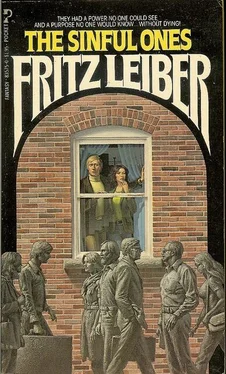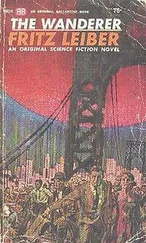Fritz Leiber - The Sinful Ones
Здесь есть возможность читать онлайн «Fritz Leiber - The Sinful Ones» весь текст электронной книги совершенно бесплатно (целиком полную версию без сокращений). В некоторых случаях можно слушать аудио, скачать через торрент в формате fb2 и присутствует краткое содержание. Жанр: Фантастика и фэнтези, на английском языке. Описание произведения, (предисловие) а так же отзывы посетителей доступны на портале библиотеки ЛибКат.
- Название:The Sinful Ones
- Автор:
- Жанр:
- Год:неизвестен
- ISBN:нет данных
- Рейтинг книги:3 / 5. Голосов: 1
-
Избранное:Добавить в избранное
- Отзывы:
-
Ваша оценка:
- 60
- 1
- 2
- 3
- 4
- 5
The Sinful Ones: краткое содержание, описание и аннотация
Предлагаем к чтению аннотацию, описание, краткое содержание или предисловие (зависит от того, что написал сам автор книги «The Sinful Ones»). Если вы не нашли необходимую информацию о книге — напишите в комментариях, мы постараемся отыскать её.
Carr Mackay had an okay job, a beautiful woman and a lot of big plans—a pathway marked for himself through life.
But one day he met a beautiful, frightened girl who didn’t quite belong in this world. An something began. Irrevocably. Something that diverted him forever from his path, shook the sleepy dust from his eyes and brought him to a startling confrontation with the furthest limits of life, death—and an alien, terrifying danger…
The Sinful Ones — читать онлайн бесплатно полную книгу (весь текст) целиком
Ниже представлен текст книги, разбитый по страницам. Система сохранения места последней прочитанной страницы, позволяет с удобством читать онлайн бесплатно книгу «The Sinful Ones», без необходимости каждый раз заново искать на чём Вы остановились. Поставьте закладку, и сможете в любой момент перейти на страницу, на которой закончили чтение.
Интервал:
Закладка:
It was as if all the life-fluid in the figures before him had drained away through a huge single gash.
Sober people feel, for brief moments, that all life and meaning have suddenly gone out of everything around them—the sounds, the words, the people. To a drunken person it is more intense.
It seemed to Carr, as he swayed there squinting, that the Pendletons’ world wasn’t real. These were window dummies dancing. The jabbering voices from the library were recordings, droning up from the hollow insides of animated statues. And look at the orchestra! See how the rigid brown hand thumped the base viol, while two other hands jerked up and down above the piano keys and yet another pair shifted along the saxophone. One saw such trios, made of painted tin, in the windows of toyshops. These were larger and of infinitely more skillful workmanship, but the music still came from somewhere else.
Glass walls, had he thought? These people were behind glass walls, all right, the glass panels of a showcase. They were toys grown to a size where their clockwork racket out-dinned the universe.
Even Marcia was just an elaborate mechanical doll. Somebody had stuck a key in her side, wound her up, and now she whirled and whirled.
Like Keaton Fisher, they were all just ticking.
In a moment they would realize his presence. Enraged that a living man had blundered into the mechanical saturnalia, they would rush at him, a metal tide, glittering, flashing, clashing, flailing him with their metal arms, stamping him with their metal feet. Even now—
He flinched, spun around, saw the door to the stairs, lunged for it.
Carr stared at the bronze lion as if it were the one object in an otherwise empty universe. Then stone, shadow and night soared into being, dwarfing the turmoil of feelings that had been spinning his mind and speeding his feet.
He looked around a little foolishly, realizing that he was standing in front of the Art Institute, on the lakeward side of Michigan Boulevard. He remembered the walk downtown only as a progression of things seen without being noticed. A distant electric sign beamed the time at him—3:39. He felt chill dribbles of sweat on his cheeks. His evening shirt was wet under the armpits. He put his hand to his throat, gathering up the lapels of his tuxedo.
He walked up the stone steps an touched the lion, gingerly, as a child might.
A little later he felt the impulse to walk. But not drivingly—just to drift.
As he moved north along the tremendous boulevard, an occasional whizzing car curtsied apologetically at the cross streets. He was still drunk enough to have an illusion of being very tall and moving majestically.
He veered across the boulevard and stood in front of the dark entry of the public library. Suddenly he realized that something was pulling him through the night, drawing him along by an indefinite number of strands fastened deep in his brain and heart—strands so gossamer thin that one could never possibly become aware of them unless some other force were to oppose them.
The pulls felt very real. It almost seemed to him that he could lean back against them, trusting to their force to keep him from falling.
And they lured. They carried a promise of mystery.
He concentrated with the fixity of a mystic, clearing his mind of all random thoughts and letting his sensation float free, trying to feel and respond to the pulls.
He yielded to them.
The streets were deserted and there was no wind. He passed a bare newsstand. His foot rustled a torn sheet of newspaper.
The pulls continued, though without strengthening. As if a magnet drawing him on were receding as he walked, keeping always the same distance.
Halfway down this block the pull abruptly changed direction, drawing him into a narrow alley, a mere slit between giant walls.
It was too dark to see. He held his hands outstretched and felt ahead with each foot before trusting his weight to the large cobblestones. He could guide himself in a general way by the vertical streak of smoky light shot with strange blue glows at the far end.
After perhaps twenty steps he haled uncertainly. He began to hear muffled laughter and talk, strains of raucous music.
As he edged along the dark alley, he wondered what it could be that he was following. Some actual trail in the pavement or air—chemical or electrical traces that impinged on the senses too subtly for conscious recognition? Or was it submerged memories of something that had happened to him before—perhaps during one of the amnesia attacks? Or even some kind of posthypnotic suggestion?
But thinking interfered with his ability to sense the trail. He must make his mind like that of an amoeba that automatically drifts towards the shadows.
He emerged at the other end of the alley.
He found himself looking into the window of a music store, scanning by streetlight the sheet music and record albums and toy instruments. For a while he stood with his face pressed to the glass door, trying to make out what was inside.
From nowhere, a title dropped into his mind. The Moonlight Sonata. His thoughts bent and shuddered as if from a gust of wind. For a moment he was about to remember everything…
He came to a movie theater. Green-eyed three-sheets leered at him from the lobby and clutched with white claws at shadowy female forms whose terror-stricken faces implored rescue. A sign in front said: “You’ll Stare! You’ll Scream! You’ll shiver with Delicious Panic, as the Mad Monster Roams the Darkened Streets, Seeking His Prey!”
In front of the box office, the oddest thing happened. The trail abruptly veered toward the curb and changed completely in quality. Up to this point it had been quiet, almost sedate, if you could use such words. Now it suddenly became wild, ecstatic, “hot”—the spoor of something crazy and joyful. Carr had come to a place where, if he’d been a dog, he’d have given an excited yelp and bounded off into the brush.
He became suspicious. It wasn’t only that the change in the trail frightened him with its suggestion of the abandonment of sanity.
Dogs usually bounded off at an angle because they’d struck a different scent.
There must be two trails.
He spent almost a quarter-hour beating back and forth. What made it so difficult was that every time he struck the “hot” trail, it ruined his ability to sense the other for several seconds. Eventually he managed to plot them out to his satisfaction.
The hot trail came from around the next corner, circled deliriously in front of the theater, then shot off across the street. The quite trail made one of its side-tracks into the theater and then came out again.
He shook his head. It was all so utterly strange. As if the tails were two of his moods. One melancholy, almost soothing. The other mad, daredevil, crazily impudent.
After a couple of false starts he followed the quite trail across the next street and down another block where it turned a corner. It seemed to grow stronger, or perhaps that was because there was no longer a distinction.
He came into the business district. Here the feeling of hostile desolation, that had accompanied him for some time, increased markedly. It wasn’t only that the liquor was dying in him. Back by the stores and theaters there had been at least the ghost of some sort of human excitement, however cheap and stale, the glamour of tawdry lures hung to enmesh human appetites. But these great looming office buildings, with their trappings of iron-work and facings of granite, actually wanted to be ugly. They gloried in their stony efficiency, their indifference to human desires, their gray ability to crush out happiness.
Carr’s eyes went uneasily from side to side. Did that narrow black façade, shooting up dizzily, jerk forward a little, as if giving an inscrutable nod? There was something exceedingly horrible in the thought of miles of darkened offices, empty but for the endless desks, typewriters, filing cabinets, water coolers. What would a stranger from Mars deduce from them? Surely not human beings. Here reigned grinding death, by day as well as night, only now it put off its disguises.
Читать дальшеИнтервал:
Закладка:
Похожие книги на «The Sinful Ones»
Представляем Вашему вниманию похожие книги на «The Sinful Ones» списком для выбора. Мы отобрали схожую по названию и смыслу литературу в надежде предоставить читателям больше вариантов отыскать новые, интересные, ещё непрочитанные произведения.
Обсуждение, отзывы о книге «The Sinful Ones» и просто собственные мнения читателей. Оставьте ваши комментарии, напишите, что Вы думаете о произведении, его смысле или главных героях. Укажите что конкретно понравилось, а что нет, и почему Вы так считаете.









